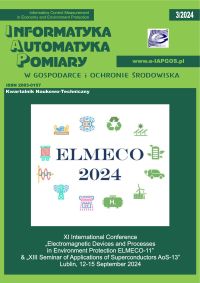WYDAJNOŚĆ IMPLEMENTACJI PODSTAWOWYCH METOD CAŁKOWANIA W ŚRODOWISKU APP INVENTOR
Abstrakt
W niniejszym artykule dokonano porównania wydajności podstawowych metod całkowania zaimplementowanych w środowisku App Inventor oraz Java dla platformy Android. Wybrane metody (prostokątów, trapezów i Simpsona) zastosowano dla funkcji liniowej, sześciennej oraz sinusoidy. Rezultaty eksperymentu wykazały, że działanie algorytmów zaimplementowanych w App Inventor jest wielokrotnie wolniejsze niż w Java dla Android, co znacząco ogranicza przydatność środowiska App Inventor do tworzenia aplikacji realizujących obliczenia matematyczne.
Słowa kluczowe:
przetwarzanie mobilne, inżynieria sterowana modelami, MDE, Android, App Inventor, całkowanie numeryczneBibliografia
Chadha K.: Improving the usability of App Inventor through conversion between blocks and text. Undergraduate thesis. Wellesley College, 2014.
Google Scholar
Conder S., Darcey L.: Android wireless application development. Addison-Wesley, 2011.
Google Scholar
Dahlquist G., Bjorck A.: Metody numeryczne. PWN, Warszawa 1983.
Google Scholar
Grover S., Pea R.: Using a discourse-intensive pedagogy and android's App Inventor for introducing computational concepts to middle school students. Proceedings of the 44th ACM technical symposium on Computer science education. ACM, New York 2013.
Google Scholar
Jordan L., Greyling P.: Practical Android Projects. Apress, 2011.
Google Scholar
Karakus M., Uludag S., Guler E., Turner S.W., Ugur A.: Teaching computing and programming fundamentals via App Inventor for Android. 2012 International Conference on Information Technology Based Higher Education and Training (ITHET). IEEE, 2012.
Google Scholar
Kepley S.: Rapid development of mobile apps using App Inventor and AGCO API. Master of Science thesis. Kansas State University, 2014.
Google Scholar
Morelli R., de Lanerolle T., Lake P., Limardo N., Tamotsu E., Uche C.: Can Android App Inventor bring computational thinking to K-12?. Proceedings of the 42nd ACM technical symposium on Computer science education. ACM, New York 2011.
Google Scholar
Roy K., Rousse W.C., DeMeritt D.B.: Comparing the mobile novice programming environments: App Inventor for Android vs. GameSalad. Frontiers in Education Conference (FIE), 2012. IEEE, 2012.
Google Scholar
Sung W.-T., Lin J.-S.: Design and implementation of a smart LED lighting system using a self adaptive weighted data fusion algorithm. Sensors 13/2013, s. 16915-16939.
Google Scholar
Wolber D., Abelson H., Spertus E., Looney L.: App Inventor: Create your own Android apps. O'Reilly Media, 2011.
Google Scholar
developer.android.com, dostęp 04.09.2014r.
Google Scholar
appinventorblog.com, dostęp 04.09.2014r.
Google Scholar
appinventorblog.com/2011/08/09/app-inventor-discontinued-the-good-the-bad-and-the-ugly/, dostęp 04.09.2014r.
Google Scholar
appinventor.mit.edu, dostęp 07.09.2014r.
Google Scholar
readwrite.com/2011/08/16/mit_launches_center_for_mobile_learning_with_suppo, dostęp 04.09.2014r.
Google Scholar
Statystyki
Abstract views: 205PDF downloads: 91
Licencja

Utwór dostępny jest na licencji Creative Commons Uznanie autorstwa – Na tych samych warunkach 4.0 Miedzynarodowe.
Inne teksty tego samego autora
- Piotr Wójcicki, Paweł Powroźnik, Kamil Żyła, Stanisław Grzegórski, WPŁYW ALGORYTMÓW STEROWANIA ROBOTEM MOBILNYM NA PROCES UNIKANIA PRZESZKÓD , Informatyka, Automatyka, Pomiary w Gospodarce i Ochronie Środowiska: Tom 8 Nr 4 (2018)








